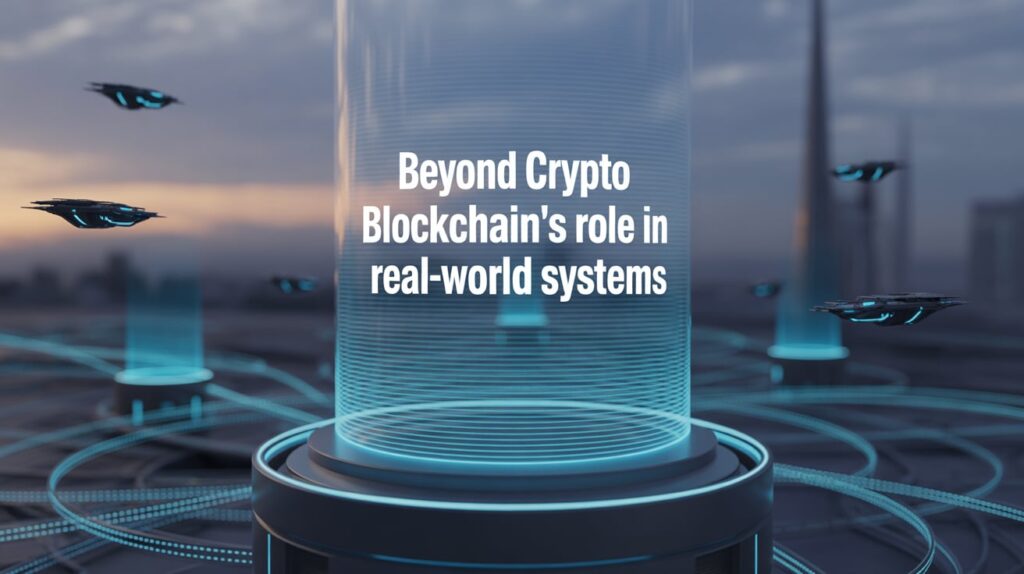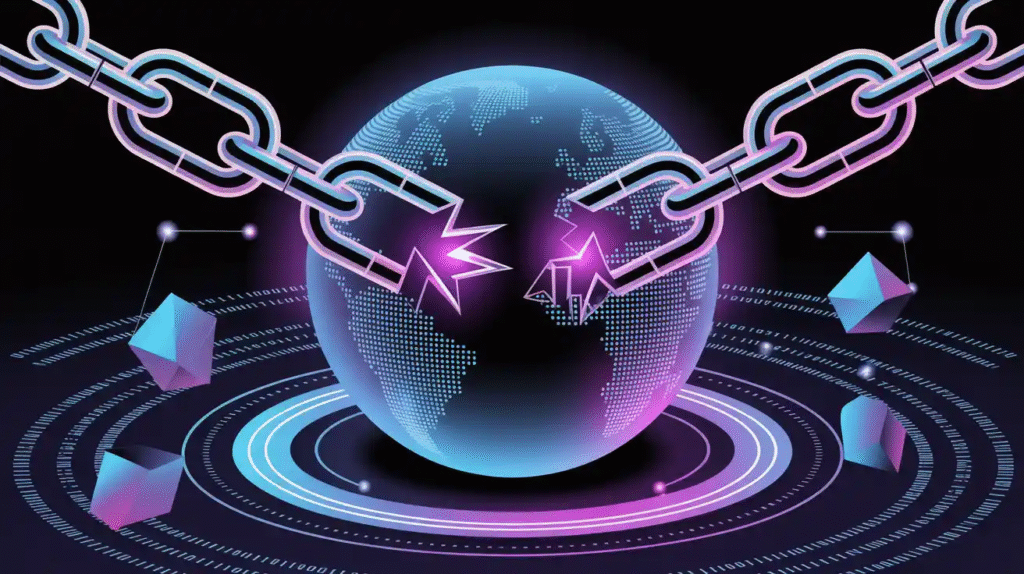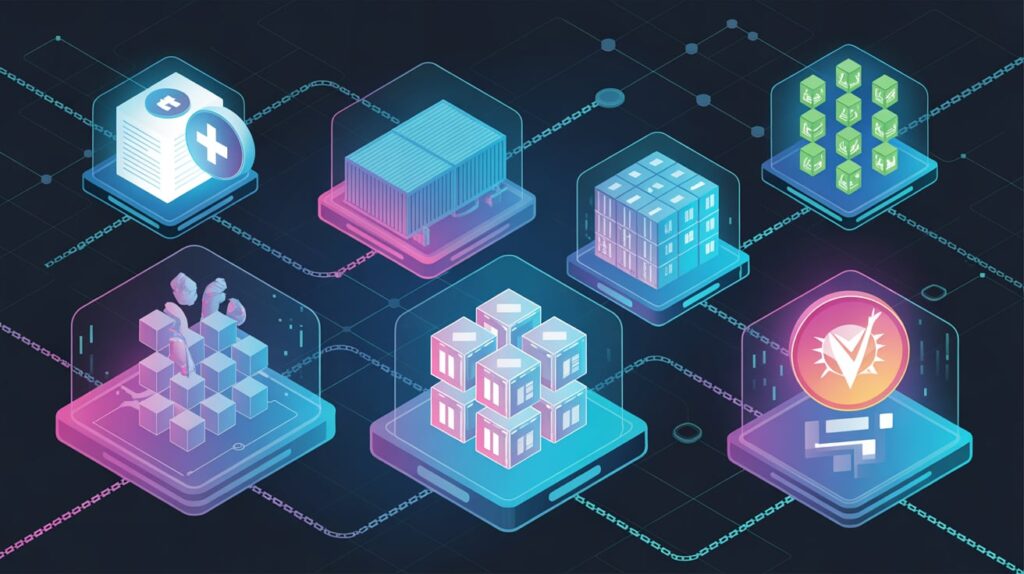When people hear blockchain, most of them quickly think about Bitcoin or cryptocurrency. That is not wrong, but it is also very limited way of looking at it. Blockchain is not only about coins or tokens, it is about creating decentralized systems that can change how industries operate. The concept is bigger than money. It’s about trust, transparency, and reducing middleman in places where they were controlling everything.
If you explore carefully, you will see how blockchain is moving into health, supply chains, education, contracts, and even government work. That is why the idea of beyond crypto blockchain is important. The future is not about only investing in coins, it’s about building systems that actually solve problems in daily life.
Blockchain Applications Shaping Real Systems
Supply Chain Tracking and Transparency
One of the strongest blockchain applications is in supply chain. Big companies face problem of fake products, delays, and hidden costs. By using blockchain, every step of product journey can be recorded. If you buy a medicine, blockchain can show you where the ingredients came from, how it was stored, and when it reached pharmacy. That level of transparency builds trust.
For example, food companies use blockchain to trace vegetables from farm to shelf. If some disease outbreak happen, they can quickly find which farm is responsible. That saves both money and lives.
Healthcare Record Management
Medical industry always struggle with records. Data is stored in silos, hospitals don’t share easily, patients lose history when they change city. Blockchain can fix this by giving one digital record owned by the patient but accessible by doctors with permission.
This reduces errors, duplicate tests, and even fraud. In some trials, blockchain also help in tracking vaccines distribution, making sure supply is not stolen or expired. It’s still early, but healthcare is moving toward enterprise blockchain adoption slowly.
Digital Identity and Authentication
Everyday we use IDs, passwords, and biometrics to prove who we are. But central databases get hacked often. Blockchain offers decentralized identity. That means your ID is verified but not stored in one place where hackers can attack.
Students can keep their education certificates on blockchain. Workers can prove employment history. Citizens can use blockchain IDs for voting. This can solve identity theft and bureaucracy problems.
Smart Contracts and Decentralized Systems
What Smart Contracts Actually Do
People talk a lot about smart contract adoption but many still don’t understand. A smart contract is basically a computer code that runs automatically when conditions are met. No need for a lawyer, notary, or bank in between.
For example, if you rent a house, the smart contract will release access to the door lock once payment is verified. If payment is late, contract cancels itself. This removes disputes and delays.
Decentralized Finance and Beyond
Yes, DeFi is connected to money, but the bigger point is how decentralized systems remove central authority. Loans, insurance, investments all can be handled directly between people and smart contracts.
Beyond finance, decentralized systems are used in governance. Communities vote on proposals directly without manipulation. In digital content, artists use smart contracts to receive royalty every time music or art is sold. That is power of automation.
Real-World Challenges of Adoption
It’s not always smooth. Smart contracts are code, and if code has bugs, it can be exploited. Also, legal systems are still not fully ready to accept blockchain contracts as official in many countries.
Scalability is also a challenge. If too many people use blockchain at same time, networks can get slow or expensive. Still, developers are working on solutions like layer 2 networks to make it faster and cheaper.
Blockchain Use Cases Across Industries
Education and Certification
Fake degrees and certificates are a big issue worldwide. Blockchain can verify education history. Universities can issue certificates directly on blockchain, making it impossible to forge. Employers can check instantly if a document is real.
Some startups are already doing this in Europe and Asia. This kind of blockchain use cases help reduce fraud and save time in hiring.
Government and Public Records
Imagine land records stored on blockchain. Nobody can change ownership secretly or steal property through corruption. Some states in India and African nations are testing land registry with blockchain.
Public contracts also benefit. Instead of secret deals, contracts can be placed on blockchain, giving citizens transparency. This fight corruption and builds trust between people and government.
Energy and Sustainability
Energy companies are testing blockchain for peer-to-peer energy trading. If someone has solar panels, they can sell extra electricity directly to neighbor using blockchain. No need for big central company to control everything.
This also helps track carbon credits and sustainability goals. Companies can prove their green claims because every transaction is recorded. This is a powerful enterprise blockchain move that can influence climate goals.
The Future of Enterprise Blockchain
Big Companies Entering the Space
In the beginning blockchain was seen as toy for tech geeks. Now big companies like IBM, Microsoft, Walmart are testing enterprise blockchain solutions. They are not talking about crypto coins, but about real tools for daily operations.
Banks use blockchain for cross-border payments. Logistics companies use it for shipping. Even fashion brands test it for authenticity of luxury goods.
Integration With AI and IoT
The future is not blockchain alone. When combined with artificial intelligence and Internet of Things, results are bigger. For example, IoT sensors collect real time data, blockchain stores it securely, and AI analyze it for insights.
This trio can change industries like transport, healthcare, and agriculture. A farm sensor sending soil quality data to blockchain, then AI suggesting fertilizer use, is one practical scenario.
Roadblocks Ahead
Still, future is not guaranteed. Laws are unclear, governments are nervous about losing control, and many people still don’t trust blockchain because of scams in crypto.
Education is needed. More case studies and pilot projects must prove blockchain can deliver results at scale. Once trust is built, wider adoption will follow.
Conclusion
The conversation about blockchain has to move beyond crypto blockchain. Cryptocurrencies opened the door, but the real revolution is in how blockchain creates transparency, security, and efficiency in real-world systems. From blockchain applications in supply chain and healthcare to smart contract adoption in finance and property, the technology is slowly reshaping industries.
We also saw blockchain use cases in education, governance, and sustainability that show its wide potential. And with enterprise blockchain adoption by big companies, the future looks stronger.
Still, challenges exist. Laws, scalability, and public perception must be handled. But if innovation continues, blockchain can become as common as the internet itself. Businesses, governments, and individuals who start learning now will be ahead tomorrow.
Because blockchain is not only about coins in a digital wallet. It is about systems that are fair, open, and built for the future.




